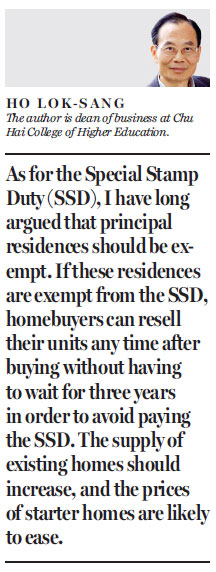Increasing supply is the best solution to high housing prices
Updated: 2017-01-04 07:47
By Ho Lok-sang(HK Edition)
|
|||||||||
Ho Lok-sang writes that it would be very foolish to engineer a decline in housing prices as this could result in serious consequences for the economy and for people's livelihoods
The housing market has hit the headlines once again. The Rating and Valuation Department's latest report suggests Hong Kong's housing prices went through the roof and recorded a record high in November. The increase since the last trough in February 2016 amounted to 13 percent.
Some academics have come up with new ideas to reduce home prices. Professor Stephen Ching from the University of Hong Kong explained that there were good reasons why new stamp duties did not work. He explained that while these new stamp duties did ease demand, they also reduced supply, as existing owners were less inclined to sell. To engineer a price decline, he suggested that owners of investment properties and overseas buyers be liable to a "super rates levy", which would be 20 times the current rates payable. Such a levy would certainly kill all investment demand, and housing prices should indeed fall with the proposed policy, but there would be a huge price to pay. Home prices would not just fall but nosedive, as all investment demand dried up. Investors would scramble to unload their properties; I would expect a major housing price crash. This would almost certainly hurt all homebuyers, including first-time buyers who had purchased properties within the last three years. New buyers would wait, prices would continue to fall and the economy would suffer: Jobs, public revenue, corporate profits, would all fall. The consequences would be dire.
As a veteran housing market analyst, I would strongly advise against any attempt to engineer a price decline. It is not worth it. People would rather not be able to buy a home than lose their jobs.

My point is this: Investment in rental properties is a legitimate activity. For many people, property provides vital security in their old age. Many retired people rely on rents to pay for their needs. Rental property investors also make their properties available for those who would rather rent than buy.
My other point is: If housing prices continue to rise, there is usually a good reason and the higher prices have economic functions. Keeping a lid on housing prices may not actually be wise.
Yes, some people will not then be able to afford to buy. But other people are buying! These others may have a greater need and therefore may want to give up more of other consumption in order to buy. They may also just be richer. In this case they will be in a better position to weather a housing price decline that may take place. After all, the government is making a tremendous effort to raise housing supply and that is the only way to meet the greater demand for housing which we are witnessing.
Some of us are worried about housing prices becoming so high that a crash will become very painful. Yes, we should be concerned about market crashes. But the Hong Kong Monetary Authority has made the necessary precautions to ensure that our banking system is sound, and that homebuyers are not excessively leveraged. So I am not worried that a housing market downturn will cause too big a problem. Moreover, while I expect some market corrections as interest rates rise over the next few months and as supply goes up, there should be no major crash in the absence of wrong-headed policies.
The strength of Hong Kong's housing prices is partly based on strong household formation and partly on very strong purchases from mainland investors. Since home purchases by Hong Kong buyers certainly should take precedence over purchases from overseas buyers, there is logic in the Buyer's Stamp Duty. But as for the Special Stamp Duty (SSD), I have long argued that principal residences should be exempt. If these residences are exempt from the SSD, homebuyers can resell their units any time after buying without having to wait for three years in order to avoid paying the SSD. The supply of existing homes should increase, and the prices of starter homes are likely to ease.
The SSD, by reducing second-hand supply, is likely the reason for the very strong price increases of entry-grade homes. Because prices have gone up so much, developers are producing smaller and smaller flats. Donald Tsang Yam-kuen, the financial secretary in 1997, at that time advised first-time buyers to consider properties in the existing home market, saying they were much more affordable. This recommendation made sense then, but does not make much sense now because even starter homes routinely ask $10,000 plus per square foot. In 1997, at the peak before prices crumbled, flats less than 40 square meters sold for an average of $63,083 per square meter in the New Territories, about 85 percent of the price of large flats with area over 160 square meters. In the third quarter of 2016, this ratio had gone up to 125 percent. The smallest flats now sell at $103,801 per square meter! No wonder developers want to produce very tiny flats.
(HK Edition 01/04/2017 page10)